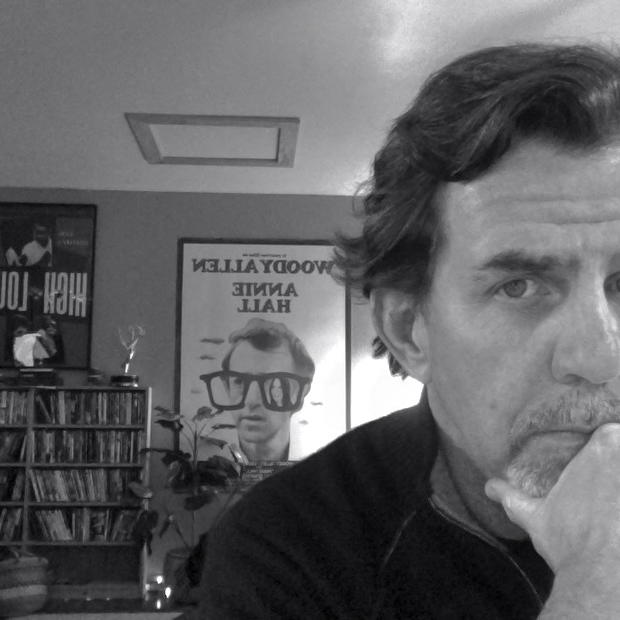 One of the many earthy delights of Inherent Vice is the fact that it was shot on 35mm film, the celluloid looking like it was dipped in bong water and left to dry on a Manhattan Beach veranda, circa1970. Digital would have been all wrong for this movie, steeped in the funk of dirty feet, sand in the crotch and purple in the haze, a shaggy-dog story ambling through shag carpeted halls, boho pizza joints, weed-fogged mansions, gleaming corporate insane asylums run by dentists and the always slanting sun of another day in la-la land, guided by a quizzical paranoid stoner with a perfected So-Cal slouch and muttonchops that look like, well, legs of furry lamb pasted to his cheeks.
One of the many earthy delights of Inherent Vice is the fact that it was shot on 35mm film, the celluloid looking like it was dipped in bong water and left to dry on a Manhattan Beach veranda, circa1970. Digital would have been all wrong for this movie, steeped in the funk of dirty feet, sand in the crotch and purple in the haze, a shaggy-dog story ambling through shag carpeted halls, boho pizza joints, weed-fogged mansions, gleaming corporate insane asylums run by dentists and the always slanting sun of another day in la-la land, guided by a quizzical paranoid stoner with a perfected So-Cal slouch and muttonchops that look like, well, legs of furry lamb pasted to his cheeks.
If nothing else, Inherent Vice will remind you of a time — the 1970s (here I go again) — when movies didn’t have to make total sense or play to the pre-fab expectations of the marketplace. They just had to smell right.
For those of you who have actually read the 2009 Thomas Pynchon novel upon which the movie was based (a show of hands, please), you may have an easier time following the film's plot, a louche noir of indecipherable motivations, peopled by hippies, cops, junkies and crazies, all caught in the undertow of the counter-cultural wave of free love, plentiful pot, low rent and hassle-free living, slowly pulling away into the depths. Charles Manson has ruined everybody’s good time. The police are pigs, stoners are wary, heroin addicts have lost their teeth. Nixon’s re-election and Watergate are just around the corner.
Diving head first into this roiling surf is director Paul Thomas Anderson. He has shed the ponderous cloak of pretension he wore in his last two outings -— the brooding, unappealing “flawed men” diptych of There Will Be Blood and The Master — and returned to the metronomic bounce of the great Boogie Nights, with its fevered end-of-the decade charms, sense of the era as a leash tugging the yapping, barking characters onward against their will ... or not.
Inherent Vice doesn’t have the sense of danger or urgent snap of Boogie Nights (especially in the soundtrack, which only features a couple of Neil Young songs and Johnny Nash’s overused “Wonderful World”). Nor does it share that film's tragicomic arc. But it does echo Boogie’s freewheeling vibe, its time capsule aesthetic of analog fuzz and the walk-on parade of juicy supporting characters. Even when the picture drags, when the loopy story frays into a Rorschach of split ends, you can’t bear to dismiss it. It sits on you like a favorite, faded denim shirt.
As Doc Sportello, the softhearted private dick pothead searching for his ex-girlfriend and a missing real estate magnate, Joaquin Phoenix delivers a winning performance poised between mumbly mush and absurd puzzlement. His indolent, backward-leaning gait suggests he was the role model for The Dude, except he prefers Birkenstocks to bowling shoes.
Phoenix shambles through a web of cults and drug cartels, tolerating burnouts, basket cases and bullying cops with a sweet “it’s okay with me” attitude. More echoes here, back to Robert Altman’s The Long Goodbye, and Elliott Gould’s straight-slacker version of the venerable Philip Marlowe. Like Gould, Phoenix’s expressions of disbelief at the cold-hearted weirdness of the world can sum up a generation.
He’s supported here by his genial lawyer buddy Benicio Del Toro (whom we see way too little of) and the musician-in-hiding Owen Wilson, who becomes the ersatz symbol of Doc’s labyrinthine quest. Reese Witherspoon, Maya Rudolph and Martin Short come along for the ride, as does Eric Roberts (remember Star 80 and The Pope of Greenwich Village? Anderson does), who delivers a short but fine monologue from the madhouse. Katherine Waterston (daughter of Sam) plays the missing ex, and you get the feeling Anderson cast her because she looks like so many lost hippie-chick waifs from the wasted Seventies.
And then there’s the whacked-out, egomaniacal cop, Bigfoot, Doc’s frenemy, played with righteous abandon by Josh Brolin. The long shot of Doc staring at Bigfoot as he fellates his favorite snack food, a chocolate covered banana, sets the tone of a relationship that keeps shifting until it becomes emblematic of this movie’s mantra: Nobody knows anything.
Inherent Vice, funny and full of heart, is a hymn to this dishevelment. It may be a mess, but it’s a lovely, intentional mess.
This review first appeared on The Restless Critic blog. Photo of Joaquin Phoenix courtesy of "Inherent Vice".

